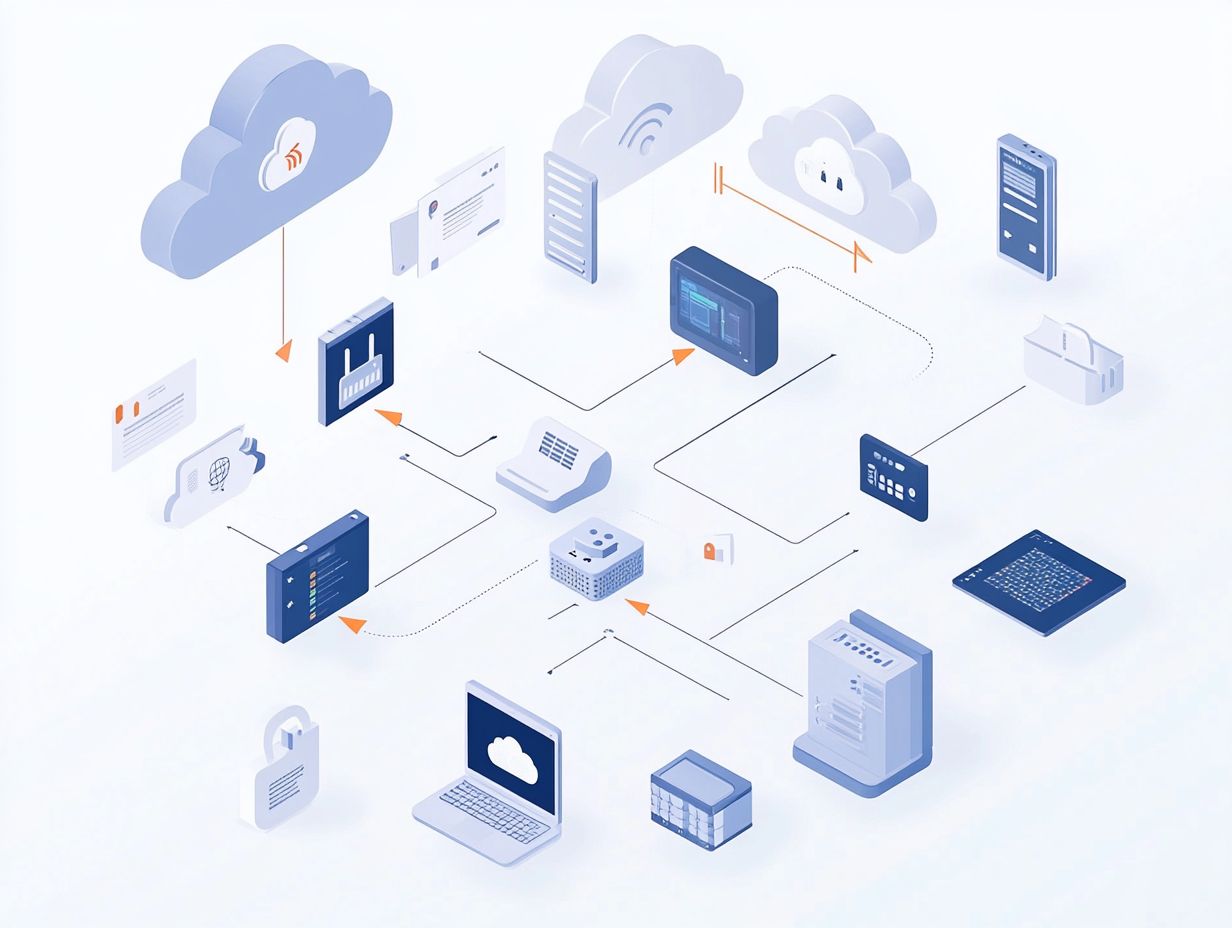Benefits of Cloud Computing Explained
Cloud computing has revolutionized how you store, access, and manage data, providing great benefits for both businesses and individuals alike. Let s unlock the future of technology together! We will explain the fundamental concepts of cloud computing, explore its benefits, and address the common concerns surrounding security and privacy.
Whether you re a business aiming to enhance efficiency and reduce costs, or an individual desiring seamless access to your data, grasping the principles of cloud computing is essential for your success. Join us to explore this landscape and discover how to maximize its potential.
Contents
- Key Takeaways:
- Understanding Cloud Computing
- Benefits for Businesses
- Why Cloud Computing is Great for You
- Potential Concerns and Solutions
- Frequently Asked Questions
- What is cloud computing and how does it benefit businesses?
- What are the main benefits of cloud computing?
- How does cloud computing help businesses save money?
- What is the extent of scalability offered by cloud computing?
- How does cloud computing improve collaboration and productivity?
- Is data stored in the cloud secure?
Key Takeaways:

Cloud computing offers cost savings and scalability for businesses, allowing them to only pay for the resources they need and easily adjust as their needs change. It increases efficiency and collaboration within businesses, enabling seamless communication and sharing of data among team members. Individuals can benefit from the accessibility and convenience of cloud computing, as well as the added security and backup for their personal data.
Understanding Cloud Computing
Cloud computing signals a revolutionary shift in how you manage and leverage IT resources, granting you access to a wide range of cloud services via the internet without the burden of extensive on-premises infrastructure. With cloud technology, you can efficiently store data, deploy applications, and scale your operations all while reducing maintenance costs and bolstering business continuity.
Using cloud services is crucial for driving digital transformation across various sectors, facilitating enhanced collaboration and fostering innovation in your daily business operations.
Definition and Basic Concepts
At its essence, cloud computing is all about delivering a range of IT services through the internet, enabling you to access data storage, processing power, and applications without the burden of physical hardware. This transformative approach gives you the power to scale resources dynamically, allowing you to adapt swiftly to evolving demands.
The primary cloud service models you should be aware of include:
- Infrastructure as a Service (IaaS): This model provides virtualized computing resources over the internet, with notable players like Amazon Web Services and Microsoft Azure leading the way.
- Platform as a Service (PaaS): Here, you can develop and deploy applications while the underlying infrastructure is managed for you, exemplified by solutions like Google App Engine.
- Software as a Service (SaaS): This model delivers software applications hosted in the cloud, with popular tools such as Salesforce and Google Workspace.
Collectively, these services present a flexible, efficient alternative to traditional IT infrastructures, streamlining your operations while effectively reducing overhead costs.
Benefits for Businesses
Cloud computing presents a wealth of advantages for your business, including substantial cost savings, improved operational efficiency, and the ability to swiftly scale IT resources to adapt to changing demands. By harnessing cloud services, you can optimize your operations, lower maintenance expenses, and enhance your disaster recovery capabilities, ensuring you keep your business running smoothly, no matter the challenges.
Moreover, the agility and flexibility offered by cloud computing give you the power to innovate more rapidly and secure a competitive edge in today s ever-evolving markets. Start your cloud journey today!
Cost Savings and Scalability

One of the most compelling advantages of cloud computing lies in its remarkable potential for cost savings. By using this technology, you can significantly reduce your financial investment in IT infrastructure while enjoying scalable solutions tailored specifically to your needs.
You only pay for what you use how cool is that? This model effectively eliminates the hefty upfront costs associated with traditional hardware purchases. With maintenance expenses minimized, you can redirect those resources toward innovation and strategic initiatives that drive your business forward.
Energy consumption also goes down, as cloud providers optimize power usage across their expansive data centers. Consider a retail business that experiences heightened demand during holiday seasons.
By utilizing cloud services, you can swiftly scale up your resources to meet that demand without the long-term commitment tied to physical servers. This flexibility enhances your operational efficiency and supports sustainable growth as your needs continue to evolve.
Increased Efficiency and Collaboration
Cloud computing significantly enhances your organizational efficiency by providing collaboration tools that foster seamless communication among remote employees. This ultimately boosts overall employee satisfaction.
By using features such as shared document storage, your teams can easily access and edit files in real-time. This ensures that everyone remains aligned, no matter where they are located.
Project management applications allow for effective task delegation and tracking. This not only streamlines workflows but also cultivates a strong sense of accountability among team members.
These tools contribute to a more interconnected work environment, enhancing user experiences as employees collaborate effortlessly. This sense of connection can elevate morale; as teams feel empowered and valued, they are more likely to drive productivity and innovation throughout the organization.
Why Cloud Computing is Great for You
For you, cloud computing offers unparalleled accessibility to your documents, photos, and applications.
Imagine being able to access your data from virtually anywhere, all while enjoying enhanced security and strong backup options. It’s an opportunity to take control of your digital life with ease and confidence.
Accessibility and Convenience
Imagine accessing your apps and data anytime, anywhere, thanks to its remarkable remote access capabilities. In today s digital age, this is the epitome of convenience.
This transformative technology has completely reshaped the way you tackle tasks, enabling seamless collaboration without the constraints of geography. Take, for instance, applications like Google Workspace, which offer real-time editing and sharing features, allowing you to work together effortlessly, no matter where you are.
Similarly, Microsoft OneDrive provides secure storage and straightforward file retrieval, ensuring your essential information is always within reach across various devices. These platforms not only boost your productivity but also cultivate a more flexible work environment, empowering you to harmonize your professional obligations with personal commitments.
Ultimately, the accessibility offered by cloud computing enables you to unlock your full potential while enjoying a richer quality of life.
Data Security and Backup

In cloud computing, ensuring data security and reliable data backup is absolutely paramount. Cloud services employ advanced encryption methods to protect your sensitive information from unauthorized access. How secure is your data?
This level of protection not only strengthens the safety of your data but also instills confidence for your business to migrate critical processes to the cloud.
With robust privacy controls and compliance with regulations like GDPR, your personal information and sensitive data are further safeguarded, aligning with legal standards. By incorporating automatic data backup solutions, these services significantly reduce the risk of data loss, allowing you to focus on your core operations without the constant worry of potential disruptions.
Ultimately, this combination of features enhances your peace of mind, making cloud computing a reliable and secure choice for modern enterprises. Discover how cloud computing can transform your life today!
Potential Concerns and Solutions
While cloud computing presents a wealth of advantages, it also introduces potential security concerns that you need to address when contemplating cloud migration and selecting the right cloud provider.
Addressing Security and Privacy Concerns
To address security and privacy concerns in cloud computing, you must implement robust data encryption methods. Additionally, ensure compliance with privacy regulations to protect sensitive information.
Regular security audits are crucial for identifying vulnerabilities and maintaining rules that protect data privacy.
Employee training on data protection is another essential strategy. Educating your team about the importance of safeguarding information and recognizing phishing attempts can make a significant difference.
Consider that prominent cloud providers like AWS and Azure prioritize security through advanced encryption technologies and comprehensive compliance frameworks.
By choosing leading cloud providers, you re not just enhancing your security you re building a fortress for your data!
Choosing the Right Cloud Computing Service
Selecting the right cloud computing service is essential for achieving optimal technology integration and seamless cloud migration. It demands thoughtful consideration of various cloud providers and their unique offerings.
Beyond pricing which can fluctuate significantly between providers you must delve into the contracts that outline service expectations to ensure uptime and performance metrics align with your business requirements.
Evaluating the quality of customer support is equally crucial. Prompt assistance can significantly enhance your operational efficiency.
As your organization grows and its needs evolve, hybrid cloud solutions become increasingly attractive. They provide tailored environments that strike a balance between on-premises resources and scalable cloud services.
This flexibility not only improves data management but also addresses compliance and security needs, uniquely aligned with your organization s infrastructure.
Frequently Asked Questions

What is cloud computing and how does it benefit businesses?
Cloud computing is the delivery of computing services, such as storage, servers, and applications, over the internet. It allows businesses to access and use these services on-demand, without the need for physical infrastructure.
This results in cost savings, increased flexibility, and scalability for businesses.
What are the main benefits of cloud computing?
The main benefits of cloud computing include cost savings, scalability, flexibility, increased productivity, improved collaboration, and enhanced data security for small businesses.
Businesses can also access the latest technology and updates without having to invest in new hardware or software.
How does cloud computing help businesses save money?
Cloud computing eliminates the need for businesses to invest in expensive IT infrastructure and equipment. They can use cloud services on a pay-per-use basis, which means they only pay for what they use.
This reduces operational and maintenance costs, making it a cost-effective option for businesses.
What is the extent of scalability offered by cloud computing?
Cloud computing offers businesses the ability to scale up or down their computing resources to meet their changing needs. This means they can quickly and easily add or reduce storage, servers, or applications as their business demands fluctuate.
This flexibility allows businesses to save money and avoid underutilized resources.
How does cloud computing improve collaboration and productivity?
Cloud computing allows remote teams to access and work on the same files and applications in real-time. This improves collaboration and streamlines workflows, leading to increased productivity.
Additionally, cloud-based communication tools, such as video conferencing, facilitate smoother communication among team members.
Is data stored in the cloud secure?
Cloud computing offers enhanced security measures, such as data encryption and regular backups, to protect sensitive information. Cloud service providers also have dedicated teams to monitor and update security protocols, reducing the risk of data breaches.
However, it is important for businesses to choose a reputable and reliable cloud service provider to ensure the security of their data.




